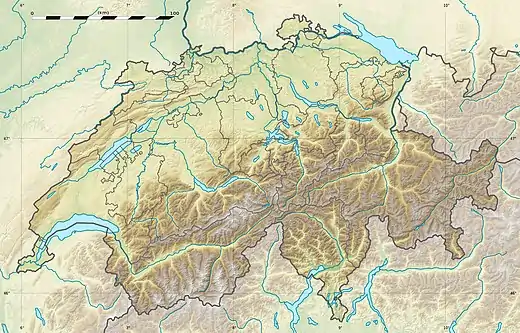| Bietschhorn | |
|---|---|
 The south face | |
| Highest point | |
| Elevation | 3,934 m (12,907 ft) |
| Prominence | 806 m (2,644 ft)[1] |
| Parent peak | Finsteraarhorn |
| Isolation | 13.4 km (8.3 mi)[2] |
| Listing | Alpine mountains above 3000 m |
| Coordinates | 46°23′28.5″N 7°51′02.7″E / 46.391250°N 7.850750°E |
| Geography | |
 Bietschhorn Location in Switzerland | |
| Location | Valais, Switzerland |
| Parent range | Bernese Alps |
| Climbing | |
| First ascent | 1859 by Leslie Stephen and party |
The Bietschhorn (3,934 m) is a mountain in canton Wallis to the south of the Bernese Alps in Switzerland. The northeast and southern slopes of the mountain are part of the Jungfrau-Aletsch Protected Area (formerly Jungfrau-Aletsch-Bietschhorn) listed as a UNESCO World Heritage Site that also includes the Jungfrau and the Aletsch Glacier. The Bietschhorn is located on the south side of the Lötschental valley and form part of the UNESCO World Heritage Region at the north end of the Bietschtal valley and Baltschiedertal valley. Most climbers approach the mountain from either the Bietschhornhütte or the Baltschiederklause.
It was first climbed on 13 August 1859 by Leslie Stephen, with guides Anton Siegen, Johann Siegen and Joseph Ebener. An account of some of Stephen's first ascents was published by Leslie Stephen in his book The Playground of Europe (1871). The Bietschhorn ascent however is not mentioned in that classic mountaineering book.
See also
References
- ↑ Retrieved from the Swisstopo topographic maps. The key col is the Beichpass (3,128 m).
- ↑ Retrieved from Google Earth. The nearest point of higher elevation is west of the Aletschhorn.
External links
- Bietschhorn on SummitPost
- Climbing the Bietschhorn (in German)
- Photographs (in German)